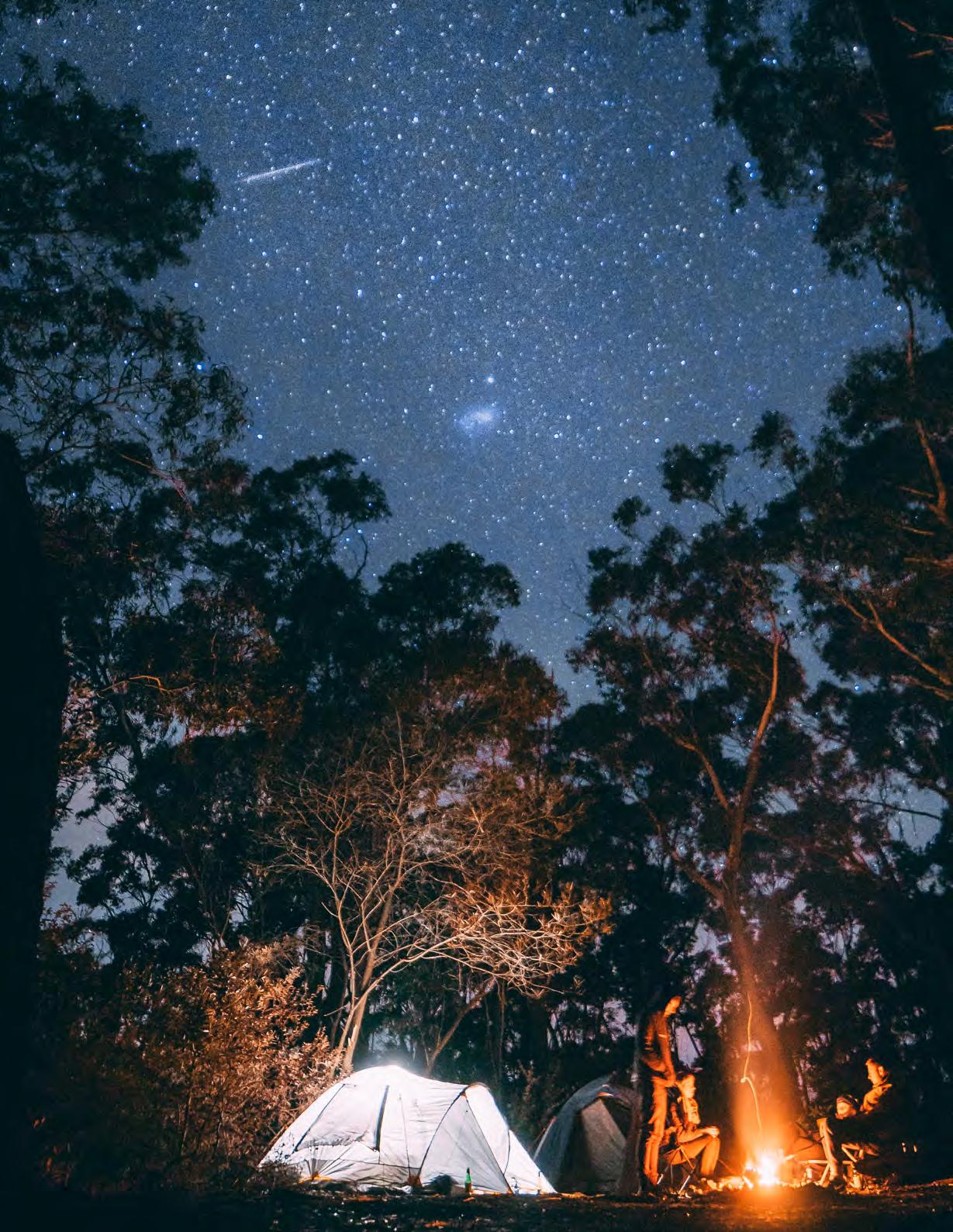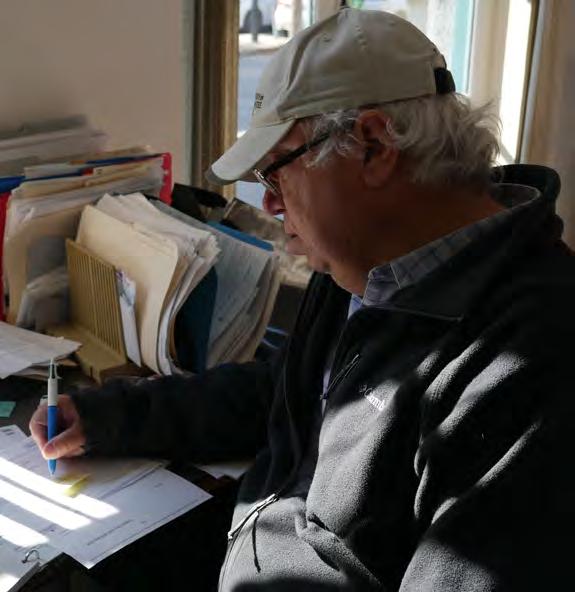
5 minute read
Mother Nature and Brother Hudon
by Fannie Dionne
Photo : Jonathan Forage, Unsplash “The best week of my life was spent on a canoe-camping trip with the Pioneer Scouts. We paddled a hundred kilometers, we only had five minutes of rain, and it was extraordinary,” said Brother Bernard Hudon, a Jesuit from Quebec, after he shared some some of the moments of consolation that he has experienced during his life. Nature and connection with others, especially as an educator, were key elements of this interview that will make you want to immerse yourself in nature.
Advertisement
A Jesuit who calls himself “one of God’s biologists” .
HOW DID YOUR RELATIONSHIP WITH NATURE INFLUENCE YOUR SPIRITUALITY AND GUIDE YOU TO THE JESUITS?
I was shaped by the Scout movement, as a youth and as a leader. The idea of social awareness and contact with nature impacted me a lot. I felt as comfortable sitting on a log as I did in a La-Z-Boy recliner. I lived my spiritual experiences in the forest, being close to young people.
Then I did my studies in the city. I have a diploma in science and a bachelor’s degree in biology. But every summer I would go back to the forest, and the idea of vocation would always come to mind. In the winter, I would try to fight against it by studying. After graduating, I found a job as a teacher in a program for wildlife conservation officers. Two months after I started teaching, the vocational question returned. So, at that point I figured I really had to address “this problem” before I could go any further.
Bernard Hudon, SJ
2011-2020 : Bursar of the Bellarmine Jesuit community and accountant for the Maison du Gesù
Minister of the House of Saint-Michel and responsible for forest management 2004-2020 : Associate researcher at the Centre justice et foi 1998-2000 : Intern at the Canadian Religious Conference, Quebec Chapter, in social justice and the environment 1988-1992 : Teacher (physics, wildlife conservation, and forestry) 1988 et 1989 : Hunting and fishing lodge grader for the Quebec Ministry of Recreation, Hunting, and Fishing 1987 : Researcher at the Quebec Ministry of Energy and Resources and the Canadian Forest Service
I had heard about a house that belonged to the Séminaire de Québec where you could continue your work or studies while reflecting on your vocation. I ended up spending two years there.
Then, with the encouragement of the superior of the major seminary, I contacted the Jesuits again. I entered the novitiate on February 1, 1992. I tried to fight against that, in the winter, by studying. After graduating from high school, I got a job as a teacher in a wildlife conservation officer course. Two months after I started teaching, the vocational ideas returned. So, at that point I thought I really had to sort out “the problem” before I could go any further.
SO FOR YOU, THE RELATIONSHIP WITH NATURE IS NOT ONLY ESSENTIAL, IT’S A SOURCE OF CONSOLATION.
Yes, my first spiritual experience took place when I was out in nature as a counselor at a summer camp. It made a big impression on me. I was sitting, leaning against a tree, on the shore of a lake. It was an experience of feeling God’s love in a personal way and also in a communal way, because I had to take care of a group of young people.
For me, it is absolutely essential to go out into the woods at least once a month.
WERE YOU ABLE TO CONTINUE YOUR CONNECTION WITH NATURE EVEN AFTER YOU JOINED THE JESUITS?
During the novitiate, we have to do a long experiment. I worked with the journal Relations. I put together a special report on forest management in Quebec. And then, during my 30-day retreat, it was clear to me and to the novice master that I was called to continue working in the field of ecology, so I was encouraged to stay as up-to-date as possible in the field. I participated in the annual conference of biologists almost every year. I also did a master’s degree in ethics at the Université du Québec à Rimouski, and my thesis was on the forest industry in Quebec.
Br. Hudon continues to lead forestry efforts at the Villa Saint-Michel, the Jesuits’ rural retreat in Quebec. photo: Gilles Mongeau, SJ
My driving force is my love of nature. Deep down, my spiritual experiences are that the power to love creation or “After that, I spent a couple of years working for the Canadian Religious Conference where I created an environment committee and sat on the social justice committee. I also put together a brief on a project to reform the Forest Act that I presented to the National Assembly of Quebec. After my theology studies, I worked with the Centre justice et foi. I found the research and writing for Relations to be very stimulating. IN OTHER WORDS, YOUR WORK IN THE SOCIETY OF JESUS COMBINES SOCIAL JUSTICE WITH ECOLOGY. For Jesuits, social involvement through the combination of faith and justice is essential. Social analysis is very important for me; working on structural inequalities, for example, when we offer input to the creatures has led me to National Assembly (where I presented three times) on behalf of people who are poor and marginalized. love the Creator. What motivates me is my love of nature. Ultimately, my spiritual experience has found its expression in my love for creation and creatures which has led me to love the Creator.
YOUR MISSION IS OBVIOUSLY ALSO DEEPLY SPIRITUAL, FOR EXAMPLE, THROUGH THE RETREATS YOU OFFER AT VILLA SAINT-MICHEL.
We use the natural sciences in our contemplation of nature. We go out into nature to observe the plants and trees and to learn how to identify them. Plankton is harvested from the lake and examined under a microscope. Ultimately, the goal is to contemplate nature. You have to love nature to appreciate it and give thanks to the Creator.
When we do the evaluation at the end of the retreat, people say that they have changed or learned a lot and that this experience has made them more aware of loving nature and the Creator. This gives me great joy.
You can read more of this article at https://bit.ly/brother-hudon

photo : Fannie Dionne










